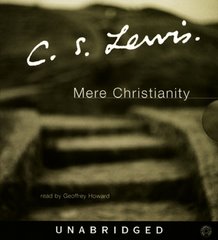Monday, November 05, 2007
Book 2, Chapter 5: The Practical Conclusion
Tuesday, October 23, 2007
Book 2, Chapter 4: The Perfect Penitent
Thursday, October 18, 2007
Mere Christianity, Book 2, Chapter 3: "The Shocking Alternative"
Tuesday, October 02, 2007
Book 2, Chapter 1: The Rival Conceptions of God
Wednesday, September 26, 2007
Mere Christianity, book 2, chapter 1: "The Rival Conceptions of God"
Tuesday, September 04, 2007
Old study; new venue
Welcome back! Since it is very difficult to get all of you together in a brick-and-mortar establishment, our MC discussions will primarily be electronic discussions this year. Facebook (search "Phrisbee Phellowship" and ask to join the group) will be our primary venue, although I hope to share content between this blog and that one.
To make things easy, our first set of discussion questions will cover all of Book 1 in Mere Christianity. This will be review for some of you, but will allow others to catch up. Participate as you are able. You'll get as much out of it as you put in.
Some atheists and agnostics get very uncomfortable around people who talk about morality in absolute terms. You don't even have to mention the name of Jesus to be accused of shoving "religion" down people's throats. That is where Lewis is taking us as we approach Book 2. He wants to make us uncomfortable. He has not yet gotten to an introduction of Jesus Christ as a remedy for man's problems and already, as a former atheist, he anticipates the impatience of his detractors.
It is that very impatience which serves to prove a point Lewis has been trying to make. Our discomfort with the thought of having a judge watching us shows that we are "haunted" by the idea of a sort of behavior we ought to practice. There must be some explanation for this universal uneasiness and an explanation for why we continue to do what makes us feel uneasy. The anger some people express when they perceive they are being judged is evidence that their conscience is already judging them.
Here we go:
- We have all known people who are "doctrinally pure" but have no passion for Christ. The Emerging Church movement is urging people to seek a more experience-based Christianity as a reaction. In reading the preface to Mere Christianity, do you think Lewis would agree that doctrine is a substitute for a real relationship with God? Why or why not?
- How do people reveal that they believe in moral absolutes even when they say they do not? How does this demonstrate the claim of Romans 2:14-16?
- Why is discomfort a good thing when you are searching out ideas that are new to you?
- "Christianity tells people to repent and promises them forgiveness." Describe how Christians offer an explanation for how we got into our present state of hating goodness and loving it?
Thursday, May 17, 2007
Good Discomfort (Mere Christianity, chapter five)
Our "live" discussion will take place at the Svendsen home on Saturday night at seven o'clock (note the change of days). For those of you who wish to comment from "afar," feel free to post comments beyond the discussion questions listed here. For local purposes, we will stick to chapter 5 (the end of book 1).
Some atheists and agnostics get very uncomfortable around people who talk about morality in absolute terms. You don't even have to mention the name of Jesus to be accused of shoving "religion" down people's throats. That is where Lewis is taking us in chapter five. He wants to make us uncomfortable. He has not yet gotten to an introduction of Jesus Christ as a remedy for man's problems and already, as a former atheist, he anticipates the impatience of his detractors.
It is that very impatience which serves to prove a point Lewis has been trying to make. Our discomfort with the thought of having a judge watching us shows that we are "haunted" by the idea of a sort of behavior we ought to practice. There must be some explanation for this universal uneasiness and an explanation for why we continue to do what makes us feel uneasy. The anger some people express when they perceive they are being judged is evidence that their conscience is already judging them.
- What are the two bits of evidence in the third paragraph of chapter 5 about the "Somebody"?
- Why is looking only at the universe Somebody made cause for us to conclude that this Somebody is quite merciless and no friend to man?
- If we are left with two options, the universe is either governed by an absolute goodness or it is not, why is either option a hopeless one for people like us?
- Why is discomfort a good thing when you are searching out ideas that are new to you?
- "Christianity tells people to repent and promises them forgiveness." Describe how Christians offer an explanation for...
- How did we get into our present state of hating goodness and loving it?
- How can God be an impersonal mind at the back of the moral law, and yet also a person?
- How can the demands of this law, which you and I cannot meet, be met on our behalf?
- How can God himself become a man to save men from the disapproval of God?

